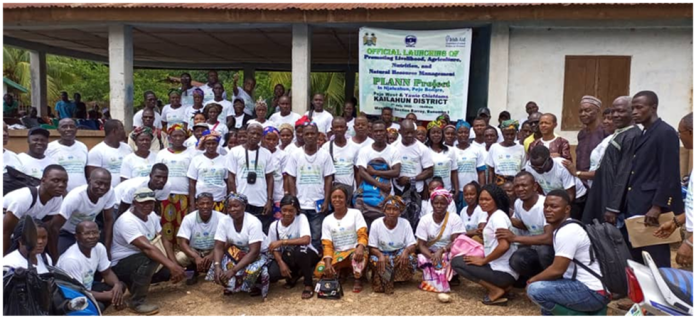By Jonathan Hindolo Kurabu, D Catalyst
Through the Movement Towards Peace and Development Agency-Sierra Leone (MoPADA-SL) and with funding support from the Irish Embassy,1,200 rural community members drawn from Njaluahun, Peje Bongre, Peje West, and Yawei Chiefdoms in Kailahun District, have launched the Promoting Livelihood Agriculture, Nutrition and Natural Resources Management(PLANN PROJECT) at the Community Barry in Bunumbu, Kailahun District.
The PLANN PROJECT, with a 12 month project life span, is geared towards ameliorating the existential and monumental problems of malnutrition and hunger in Kailahun District.
In his statement, the Paramount Chief of Njaluahun Chiefdom, Kailahun District, PC Dr. Shamsu Mustapha, underscored the timely nature of the project and appreciated MoPADA SL for the gesture.
- Dr. Shamsu Mustapha avowed that most of the serious-minded people in his chiefdom are women who toil day and night to make ends meet for their children and some exploitative husbands and urged the beneficiaries to make judicious use of the opportunity.
Deputy Chairperson, Kailahun District Council, Madam Doris Baby Momoh showered profuse gratitude on the Management of MoPADA SL for their relentless strides to bettering the lives of women in Kailahun District and also appealed for extension of the project facilities to the remaining chiefdoms in Kailahun District.
Kailahun District Nutritionist, Victor Samuel Palmer lamented on the appalling rate of malnutrition in Kailahun yet reiterating that amid the trending issue of malnutrition in the district which inhibits growth among children, yet the best food products nationwide come from Kailahun.
He appealed to pregnant and lactating mothers to embark on exclusively breastfeeding for their children for six months and urged them to eat what they grow. Similar sentiment was shared by the Crop Officer from the Ministry of Agriculture in Kailahun District, Daniel G.B. Kamara.
On his part, Executive Director, Movement Towards Peace and Development Agency-Sierra Leone (MoPADA-SL), Patrick Momoh thanked the Irish Embassy in Sierra Leone for the funding and promised to use the fund for its intended purposes.
He underscored among other things his organization’s approach to development which he affirmed is taking development to the doorsteps of the beneficiaries and noted that although four out of the fourteen Chiefdoms were selected, plans are underway to extend a similar aid to the remaining chiefdoms contingent upon the availability of funds and the seriousness attached to the PLANN project by the 1,200 beneficiaries.
In his keynote address prior to the official launch of the PLANN Project, Dr. Sulaiman Sowe, Senior Nutrition and Food Security Programme Advisor and Focal Point-Environment and Climate Change, Embassy of Ireland, said ending hunger and nutrition are one of Ireland’s International development priorities to reinsert nutrition into other headline priorities such as health, education, gender and climate adding that they have recognized that hunger and malnutrition are major impediments for children not realizing their potentials within a given timeframe.
He emphasized that numerous reports have been made about the significance of nutrition in the cognitive development of children within 0-2 years noting that the 2021 Sierra Leone National Nutrition Survey (SLNNS-2021) rates Kenema and Kailahun Districts as having the first and third highest stunting rates in Sierra Leone at 30.1% and 32.9% respectively compared to the national rate of 26.8% translating into an increase in stunting rates in Kailahun district over the last five years.
Accordingly, the PLANN Project seeks to achieve the following outcomes:
Diversified food production yields, improved nutritional status and livelihood for targeted communities, improved knowledge on nutrition , mother & childcare as well as hygiene and basic sanitation practices, breakdown of gender- specific barriers In terms of gender roles, division of responsibility and decision making at household and community levels enhances capacities of targeted households on nutrition sensitive crop production and sustainable land use and increased community- based income generation through village savings and loan associations.




